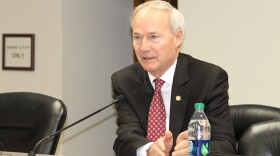The promise of some portion of $550 million in new federal funding brought together a consortium of state and national broadband leaders in mid-December at the Association of Arkansas Counties headquarters in Little Rock.
The U.S. Department of Agriculture is preparing to grant and loan money to boost high-speed broadband Internet infrastructure in rural America. The USDA Reconnect Pilot Program has an application window for this new round of funding that is set to open Jan. 31, 2020.
“This second round of ReConnect funding will help USDA be an even stronger partner in closing the digital divide in America’s rural communities,” U.S. Agriculture Secretary Sonny Perdue said. “Our core mission at USDA is to increase rural prosperity through boosting economic opportunity in rural America. We know that rural communities need robust, modern infrastructure to thrive, and that includes having access to broadband e-Connectivity. Under the leadership of President Trump and in cooperation with Congressional appropriators, USDA is proud to partner with rural communities to deploy this critical infrastructure, because we know when rural America thrives, all of America thrives.”
Some elements of the broadband push include USDA making available up to $200 million for grants, up to $200 million for 50/50 grant/loan combinations, and up to $200 million for low-interest loans. To date, USDA has awarded $191 million through the Reconnect program with offers out to 47 additional potential recipients totaling more than $600 million in investments.
David Branscum, State Director for USDA and a former state legislator from Marshall, spearheaded the December Arkansas conference. He said his goal was to get applications rolling from municipal and county governmental leaders, Electric Cooperative members, and private groups that can partner with public entities and utilities on projects in rural Arkansas.
“The conference is to bring the players in Arkansas together that could and hopefully would be encouraged to apply for USDA rural development money for broadband Internet expansion,” he said.
Branscum noted that beyond the current nearly $600 million in new funding, there is up to $1.5 billion in need of circulation through USDA programs. “We’ve got $1.5 billion in all of our programs directed toward Internet expansion.”
According to a 2018 Federal Communications Commission report, 80% of the 24 million American households that do not have reliable, affordable high-speed Internet are in rural areas.
Chris Caldwell, executive director of the Delta Regional Authority, participated in the conference. He said he’s witnessed the reality of that FCC report.
“I see McDonald’s restaurants in rural America in the bootheel of Missouri or the Delta of Arkansas that are full of kids doing homework because they need the Internet. That’s where we are. The takeaway here is that this is going to take a partnership of public, private, local, state and federal to get broadband deployed across the Delta,” Caldwell said.
For him, the challenge of broadband expansion is the key to economic opportunities in the eight state region he oversees which have some of the highest poverty rates in the country.
“Rural broadband is the equivalent of rural electrification of the 1920’s and ’30s. It is a ‘must-do’ to compete,” he said.
Elizabeth Bowles, CEO of Aristotle Inc., attended the conference. Her company has been focused on broadband expansion in the Delta for years and is working several projects in struggling parts of southern and eastern Arkansas as well as rural Oklahoma.
“There are a lot of opportunities that we need to be taking advantage of as a state. Whether it’s a municipality or an ISP, there are a lot of opportunities to bring broadband to the people who need it most,” she said.
While the promise of 5G technology is one that many are banking on to be a salvation for rural broadband, Bowles contends that we are still years away from seeing it widely available.
“5G is a promise and something that I think will be great for the future, but it’s not something the state can wait for,” she said. “I think we need to put as much investment behind as we can and when 5G comes, it will just be an added bonus.”
In 2019, Gov. Asa Hutchinson announced a $25 million state grant program called Arkansas Rural Connect. ARC will provide grants to qualifying communities of at least 500 people to deploy high-speed broadband to its residents. The high-speed broadband must have a rate of at least 25 megabits per second for download and 3 megabits per second for upload (25/3).





